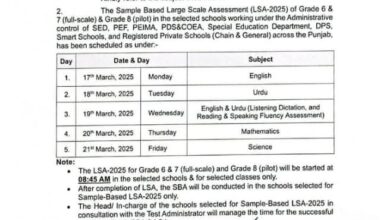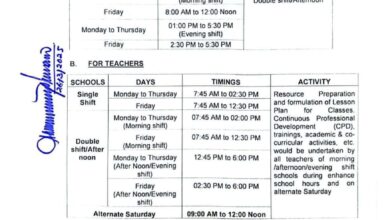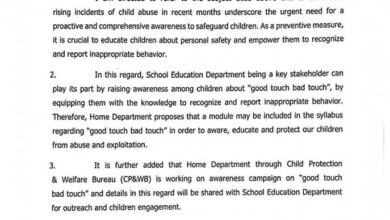Addressing Unfair Practices in Private Schools
Contents
Addressing Unfair Practices in Private Schools: Punjab School Education Department’s Order
The Punjab School Education Department has taken a significant step to curb exploitative practices by private schools in the region. On April 8, 2025, the department issued an order addressing complaints about schools forcing parents and students to purchase uniforms, books, stationery, and other academic materials exclusively from designated vendors at exorbitant prices. This article explores the details of the order, its implications, and the actions mandated to ensure fair access to education.
Background of the Issue
Private schools in Punjab have been under scrutiny for practices that burden parents financially. Many schools have been compelling families to buy essential items from specific vendors, often at inflated prices, which violates the principles of fair access to education. This has led to widespread complaints, prompting the Punjab School Education Department to intervene with a strict directive.
Key Points of the Order
The order, issued under the reference No.SO(A-I)1-31/2022, outlines the following key directives:
- Prohibition on Exclusive Vendor Purchases: Private schools are strictly warned to stop forcing students or parents to buy items from specific sources. Schools must provide an open and transparent list of required items without associating them with any particular shop or vendor.
- Legal Consequences for Non-Compliance: Institutions found violating the Punjab Private Educational Institutions (Promotion and Regulation) Ordinance will face severe penalties, including:
- Heavy fines
- Suspension of registration
- Permanent closure
- Role of District Education Authorities (DEAs): DEAs are directed to ensure strict monitoring and take immediate action on any complaints related to these practices.
Distribution of Responsibilities
The order specifies a clear chain of communication and action by forwarding the directive to various stakeholders for implementation. Below is a table summarizing the recipients and their roles:
| Recipient | Responsibility |
|---|---|
| Divisional Commissioners, Punjab | Oversee implementation across divisions |
| Deputy Commissioners, Punjab | Ensure compliance at the district level |
| Director Public Instructions (SE/EE) | Monitor and enforce the order in secondary and elementary education sectors |
| Heads of Attached Departments | Ensure adherence within their respective departments |
| Chief Executive Officers (DEAs) | Actively monitor private schools and address complaints |
| Additional Secretaries, School Education Dept. | Support the implementation process |
| Director General Public Relations | Release the notification to print and electronic media for public awareness |
| Deputy Director (Monitoring) | Oversee monitoring efforts within the School Education Department |
| PSO to Minister for School Education | Update the Minister on progress and challenges |
| PS to Secretary, School Education | Assist the Secretary in coordinating efforts |
Implications for Private Schools and Parents
This order is a significant win for parents and students who have been financially burdened by these unfair practices. By enforcing transparency and prohibiting exclusive vendor arrangements, the Punjab School Education Department aims to:
- Reduce financial strain on families
- Promote fair competition among vendors
- Ensure that education remains accessible without unnecessary costs
For private schools, this means a shift in operational practices. Schools will need to revise their policies to comply with the order or face severe consequences, which could impact their reputation and legal standing.
FAQs
Q1: What prompted the Punjab School Education Department to issue this order?
A1: The department received numerous complaints about private schools forcing parents to buy uniforms, books, and other materials from specific vendors at high prices, which violated fair access to education.
Q2: What happens if a private school does not comply with the order?
A2: Non-compliant schools may face heavy fines, suspension of registration, or even permanent closure under the Punjab Private Educational Institutions (Promotion and Regulation) Ordinance.
Q3: Who is responsible for monitoring the implementation of this order?
A3: District Education Authorities (DEAs) are tasked with strict monitoring and taking immediate action on complaints. The Deputy Director (Monitoring) also oversees efforts within the School Education Department.
Q4: How will parents know about this order?
A4: The Director General Public Relations has been directed to release the notification to print and electronic media to ensure public awareness.
Conclusion
The Punjab School Education Department’s order dated April 8, 2025, marks a crucial step toward ensuring fairness and accessibility in education. By addressing the exploitative practice of forcing parents to purchase items from specific vendors at inflated prices, the department is protecting the rights of students and their families. The strict penalties outlined in the order serve as a deterrent to non-compliance, while the clear distribution of responsibilities ensures effective implementation. This initiative not only alleviates financial burdens but also sets a precedent for transparency and accountability in the education sector. Moving forward, it will be essential for all stakeholders to collaborate and uphold the principles of fair access to education for every child in Punjab.
محکمہ تعلیم پنجاب کا احسن اقدام
پرائیوٹ سکولز کا تعلیمی مواد اپنی مخصوص جگہوں پر زیادہ قیمتوں میں فروخت کرنے کا نوٹس
ایسے نجی تعلیمی اداروں کے خلاف سخت کارروائی کا حکم جاری





